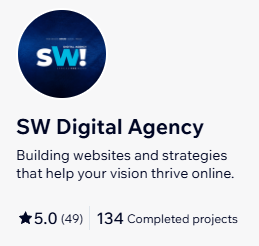Why Every Small Business Needs a Website in 2024
- Lucas Santana

- Jun 27
- 4 min read
In 2024, having a website is not just a luxury for small businesses—it's a necessity. With the digital landscape constantly evolving, a website serves as the cornerstone for any small business's marketing efforts. It provides a platform for engaging with customers, showcasing products, and facilitating sales. Let's explore why every small business needs a website this year.
Importance of Small Business Websites
A website is your digital storefront. It’s where customers go to learn more about your business, understand your offerings, and ultimately make a purchase. Here are a few compelling reasons why small business websites are crucial:
Credibility and Trust: A professional-looking website builds credibility. According to a study by Stanford, 75% of users judge a company's credibility based on its website design. If your website looks outdated or unprofessional, you risk losing potential customers to competitors with polished web presences.
24/7 Availability: Unlike a physical storefront, your website is open 24/7. This means customers can browse your offerings, place orders, or request information at any time of day. This convenience can significantly improve customer satisfaction and increase sales.
Targeted Marketing: With a website, you can utilize tools such as SEO and Google Ads to target specific demographics. This targeted approach can lead to higher conversion rates, making your marketing dollars work harder.

Establishing Your Brand Identity
A website is an essential tool for establishing and enhancing your brand identity. A clear and consistent brand image can help differentiate your business from competitors. Here are a few ways to strengthen your brand identity online:
Brand Messaging: Your website can convey your brand's mission and values through content, imagery, and design. Clear messaging helps customers understand who you are and what you stand for.
Visual Identity: Use a cohesive color palette, logo, and typography across your website. This creates a visual identity that can be recognized and remembered by customers.
Customer Engagement: Engage your visitors by incorporating features such as a blog, customer testimonials, and case studies. This interactive content not only keeps customers interested but also enhances your brand's credibility.

Do all businesses need an online presence?
In today's digital age, the answer is yes. An online presence is vital for businesses of all sizes, including those in local markets. Here's why:
Reach a Broader Audience: A website allows you to reach potential customers beyond your immediate geographical area. Even local businesses can benefit from online visibility as more consumers turn to the internet for shopping.
Customer Insights: With a website, you can gather valuable data about visitor behavior, preferences, and demographics. Analyzing this data can help you tailor your marketing strategies to better meet customer needs.
Competitiveness: If your competitors are online and you are not, you risk falling behind. A study found that 63% of shoppers will research a product online before making a purchase. If your business does not have a website, you may be missing out.

Cost-Effective Marketing Solutions
With traditional advertising methods becoming more expensive, having a website can be a more cost-effective marketing solution. Here’s how:
Lower Advertising Costs: Running ads through social media or using Google Ads can be less costly than traditional media ads. Your website serves as a landing page for these ads, ensuring that potential customers can access your business directly.
Utilizing SEO for Free Traffic: By optimizing your website for search engines, you can attract organic traffic without spending on per-click strategies. Implementing SEO best practices can improve visibility, leading to more website visitors and potential sales.
Effective Email Marketing: Having a website allows you to collect email addresses for newsletters or promotions. Email marketing has a high ROI and can be a powerful way to convert leads into customers.
Taking Action: Steps to Create Your Small Business Website
Creating a website for your small business doesn't have to be a daunting task. Here are some actionable steps to get started:
Choose a Domain Name: Select a domain that reflects your business name and is easy to remember. Ensure that it’s also SEO-friendly to help with search engine visibility.
Select a Hosting Service: Look for hosting providers that offer reliable service and good customer support. Services such as Bluehost or SiteGround are popular among small businesses.
Design Your Website: You can use website builders like WordPress, Wix, or Squarespace for a user-friendly experience. Choose a template that aligns with your brand and customize it to meet your needs.
Create Quality Content: Ensure your website has high-quality content that addresses your customers' questions and needs. Use engaging images and professional copywriting to create an informative experience.
Implement SEO Best Practices: Optimize your website using appropriate keywords, meta tags, and descriptions. Regularly update your content and utilize backlinks to improve your SEO ranking.
Track Performance: Use tools like Google Analytics to measure website traffic and customer behavior. This data can help you refine your marketing strategy over time.
The Future is Digital
In 2024 and beyond, the importance of having a website for your small business will only grow. The digital landscape continues to evolve, and consumers expect businesses to have an online presence. By creating a comprehensive and user-friendly website, small businesses can capitalize on digital opportunities.
Remember, that your website is more than just an information hub. It’s a powerful tool for engaging customers, driving sales, and building a strong brand identity. Furthermore, a well-designed website can enhance your overall business online presence and ultimately contribute to your long-term success.
Having a website is no longer optional for small businesses; it's an essential part of your strategy for growth and success in the competitive market of 2024. Embrace this digital transformation and take advantage of the opportunities that await.




Comments